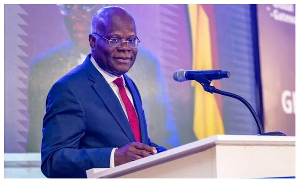- Home - News
- TWI News | TV
- Polls
- Cartoons
- Year In Review
- News Archive
- Crime & Punishment
- Politics
- Regional
- Editorial
- Health
- Ghanaians Abroad
- Tabloid
- Africa
- Religion
- Election 2020
- Coronavirus
- News Videos | TV
- Photo Archives
- News Headlines
- Press Release
- News Blogs
Business News of Tuesday, 20 August 2024
Source: thebftonline.com
Government urged to lower business costs amid rise in relocations, closures
The Ghana National Chamber of Commerce and Industry (GNCCI), a body that represents the interests of businesses and advocates policies which promote trade and commerce in the country, has stressed the need for government reconsideration of its tax system – allowing private businesses to thrive and reduce relocation and collapses.
For instance , he said, in the past few months several notable companies such as Nivea, Glovo, Bic Pens, Dark and Lovely, GAME, Jumia Foods and other multinational companies have either left or considering leaving the market, attributing their decisions to high taxes and operational cost.
The plans to depart and actual departure of these multinational companies has not only affected job creation but also had a prominent effect on the country’s GDP and tax revenues.
President-GNCCI Dr. Clement Osei Amoako, during his speech at the GNCCI new National Secretariat building’s inauguration, emphasised the need for government and the central bank to collaborate properly in bringing down cost of doing businesses – which has hampered private sector growth and led to relocation and closure.
“We specifically recommend the removal of inefficient taxes such as the COVID-19 levy, revising the current VAT system and collaborating with the Bank of Ghana to strategically increase credit for the private sector.”
Addressing challenges facing local businesses, the president highlighted excessive taxes, high lending rates, depreciation of the local currency and supply-chain bottlenecks as key limitations to their growth, particularly with Small and Medium Enterprises.
He reaffirmed GNCCI’s commitment to continually look out for the expansion of private businesses, stating: “It is for this reason that the Chamber has strived through thick and thin to build this new headquarters as a significant step toward strengthening our capacity to support and protect private businesses”.
Mr. Osei Amoako further acknowledged government’s success in renegotiating external debt under the International Monetary Fund programme which has reduced the country’s interest payments, and government’s decision to avoid introducing new tax and supplementary budgets in the mid-year budget review.
He said: “These steps have raised some confidence in the business environment amid the crucial times we find ourselves in as a country”.
Shirley Ayorkor Botchew, Minister of Foreign Affairs and Regional Integration, also congratulated the GNCCI for their project and indicated that it aligns with the mandate and dedication of the Chamber to create a favourable environment for business growth and investment.
While acknowledging the challenges faced by GNCCI, the minister reiterated government’s and her ministry’s commitment to working with the Chamber to implement policies that support private industry and drive economic growth. “We will continue to prioritise needs of the private sector to ensure that you grow and succeed.”
Despite these challenges, the minister however advised business owners to associate themselves with the GNCCI -noting that the Chamber provides opportunities for business-matching, advocacy and research, capacity building, trade facilitation, export documentation, exhibition and many business support services.
Kobina Tahir Hammond, Minister of Trade and Industry, also commended GNCCI for acquiring a new headquarters and pledged his ministry’s commitment to continuously support the Chamber in its mission of supporting and serving local businesses – and said they are eager to collaborate on policies that will drive economic growth and support the private sector.
He added that the Trade and Industry ministry’s collaboration with GNCCI will facilitate more a competitive industry to also become more export-oriented and take advantage of the African Continental Free Trade Area Agreement along with other trade agreements, both bilateral and multilateral.
Entertainment










